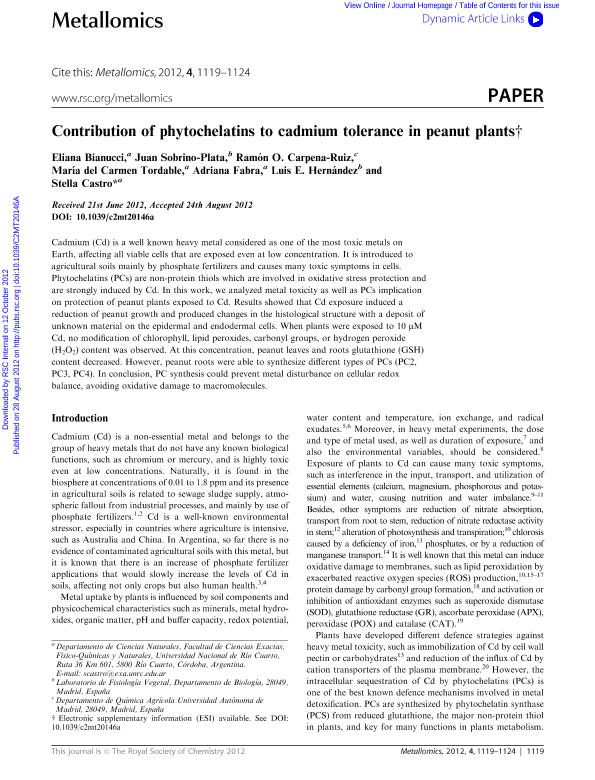Artículo
Contribution of phytochelatins to cadmium tolerance in peanut plants
Bianucci, Eliana Carolina ; Sobrino Plata, Juan; Carpena Ruiz, Ramón O.; Del Carmen Tordable, María; Fabra, Adriana Isidora
; Sobrino Plata, Juan; Carpena Ruiz, Ramón O.; Del Carmen Tordable, María; Fabra, Adriana Isidora ; Hernández, Luis E.; Castro, Stella Maris
; Hernández, Luis E.; Castro, Stella Maris
 ; Sobrino Plata, Juan; Carpena Ruiz, Ramón O.; Del Carmen Tordable, María; Fabra, Adriana Isidora
; Sobrino Plata, Juan; Carpena Ruiz, Ramón O.; Del Carmen Tordable, María; Fabra, Adriana Isidora ; Hernández, Luis E.; Castro, Stella Maris
; Hernández, Luis E.; Castro, Stella Maris
Fecha de publicación:
08/2012
Editorial:
Royal Society of Chemistry
Revista:
Metallomics
ISSN:
1756-5901
Idioma:
Inglés
Tipo de recurso:
Artículo publicado
Clasificación temática:
Resumen
Cadmium (Cd) is a well known heavy metal considered as one of the most toxic metals on Earth, affecting all viable cells that are exposed even at low concentration. It is introduced to agricultural soils mainly by phosphate fertilizers and causes many toxic symptoms in cells. Phytochelatins (PCs) are non-protein thiols which are involved in oxidative stress protection and are strongly induced by Cd. In this work, we analyzed metal toxicity as well as PCs implication on protection of peanut plants exposed to Cd. Results showed that Cd exposure induced a reduction of peanut growth and produced changes in the histological structure with a deposit of unknown material on the epidermal and endodermal cells. When plants were exposed to 10 μM Cd, no modification of chlorophyll, lipid peroxides, carbonyl groups, or hydrogen peroxide (H2O2) content was observed. At this concentration, peanut leaves and roots glutathione (GSH) content decreased. However, peanut roots were able to synthesize different types of PCs (PC2, PC3, PC4). In conclusion, PC synthesis could prevent metal disturbance on cellular redox balance, avoiding oxidative damage to macromolecules.
Palabras clave:
cadmium
,
peanut plants
Archivos asociados
Licencia
Identificadores
Colecciones
Articulos(CCT - CORDOBA)
Articulos de CTRO.CIENTIFICO TECNOL.CONICET - CORDOBA
Articulos de CTRO.CIENTIFICO TECNOL.CONICET - CORDOBA
Citación
Bianucci, Eliana Carolina; Sobrino Plata, Juan; Carpena Ruiz, Ramón O.; Del Carmen Tordable, María; Fabra, Adriana Isidora; et al.; Contribution of phytochelatins to cadmium tolerance in peanut plants; Royal Society of Chemistry; Metallomics; 4; 10; 8-2012; 1119-1124
Compartir
Altmétricas



